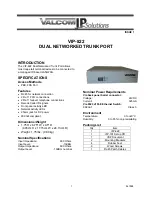
16-20
Catalyst 2928 Switch Software Configuration Guide
OL-23389-01
Chapter 16 Configuring STP
Configuring Spanning-Tree Features
Configuring Spanning-Tree Timers
The sections that follow provide the configuration steps.
Configuring the Hello Time
You can configure the interval between the generation of configuration messages by the root switch by
changing the hello time.
Note
Exercise care when using this command. For most situations, we recommend that you use the
spanning-tree vlan
vlan-id
root primary
and the
spanning-tree vlan
vlan-id
root secondary
global
configuration commands to modify the hello time.
Beginning in privileged EXEC mode, follow these steps to configure the hello time of a VLAN. This
procedure is optional.
To return to the default setting, use the
no spanning-tree vlan
vlan-id
hello-time
global configuration
command.
Table 16-4
Spanning-Tree Timers
Variable
Description
Hello timer
Controls how often the switch broadcasts hello messages to other switches.
Forward-delay timer
Controls how long each of the listening and learning states last before the interface begins
forwarding.
Maximum-age timer
Controls the amount of time the switch stores protocol information received on an interface.
Transmit hold count
Controls the number of BPDUs that can be sent before pausing for 1 second.
Command
Purpose
Step 1
configure terminal
Enter global configuration mode.
Step 2
spanning-tree vlan
vlan-id
hello-time
seconds
Configure the hello time of a VLAN. The hello time is the
interval between the generation of configuration messages by
the root switch. These messages mean that the switch is alive.
•
For
vlan-id
, you can specify a single VLAN identified by
VLAN ID number, a range of VLANs separated by a
hyphen, or a series of VLANs separated by a comma. The
range is 1 to 4094.
•
For
seconds
, the range is 1 to 10; the default is 2.
Step 3
end
Return to privileged EXEC mode.
Step 4
show spanning-tree vlan
vlan-id
Verify your entries.
Step 5
copy running-config startup-config
(Optional) Save your entries in the configuration file.
















































